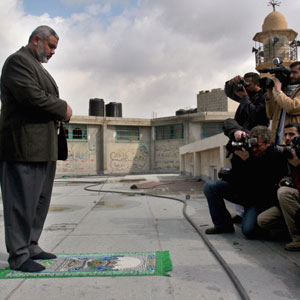
Press photographers and cameramen take pictures as Ismail Haniyeh,Hamas’ apparent choice for prime minister, prays on the roof of a mosque at the Shati refugee camp in Gaza City, Feb. 17, 2006 (AP)
RAMALLAH, West Bank (AP) – Palestinian leader Mahmoud Abbas on Saturday asked Hamas to form the next Palestinian government as quickly as possible, offering his help and encouragement to the Islamic militants.
Abbas spoke at the opening session of the new Hamas-dominated Palestinian parliament, after the new legislators were sworn in.
He said the Hamas victory in last month’s parliament election, and the defeat of his Fatah Party, have led to a new political reality. “Therefore, it (Hamas) will be asked to form the new government,” Abbas said. “On my part, you will find all the cooperation and encouragement you need, because our national interest is our first and final goal, and is above any individual faction.”
The next step would be for Hamas to name its candidate for prime minister. Hamas said its choice is the group’s pragmatic Gaza leader Ismail Haniyeh, who in the past served as a liaison between Hamas and the Palestinian Authority.
Israel and the international community have said they will not recognize a Hamas government if the group, sworn to Israel’s destruction, does not renounce violence, recognize Israel and honor existing peace agreements.
Abbas will have to decide whether to confront the powerful Islamic group and demand that it support peace moves with Israel, or cooperate with Hamas. The latter could turn the Palestinian Authority into an international pariah and destroy any hopes for new peace talks with Israel.
Mahmoud Zahar, a fiery Hamas leader newly elected to serve in parliament, called Saturday a “historic day,” and said Hamas would serve the Palestinian people.
The parliament session was being held simultaneously in Gaza City and in the West Bank city of Ramallah, with a hookup by videoconference, because Israel has prevented lawmakers from traveling between the two territories.
In Ramallah, Hamas lawmakers entered the main hall in Abbas’ headquarters in a group, one carrying a picture of jailed lawmaker Hassan Yousef. The group’s female lawmakers covered their heads in traditional Muslim fashion. A member of the Popular Front for the Liberation of Palestine placed a picture of jailed lawmaker, Ahmed Saadat on a chair in the hall. A group of foreign diplomats, including the U.S. consul in Jerusalem, also attended the Ramallah session.
In Gaza, some 2,000 diplomats and other VIPs gathered in the government complex to view the parliament session, along with about 100 women from the Hamas Women’s Union, their faces covered with veils.
Israel, the United States and the European Union, which provide funding for a majority of the Palestinian Authority’s budget, have threatened to sever financial ties with the government if Hamas does not meet their demands.
Hamas is branded a terrorist group by the United States and Europe.
Israel was also considering a basket of sanctions against the Palestinian Authority, and its Cabinet will vote Sunday on measures meant to put a stranglehold on the Hamas parliament.
Israeli officials said they were considering sealing the border with Gaza, preventing cargo from going in or out, and barring the 5,000 Gazan workers and 4,000 Gazan merchants from entering Israel for work. The moves would devastate the already impoverished Gaza economy, though Israel would continue to allow humanitarian shipments to cross into the coastal area.
Israel was also likely to freeze the transfer of roughly US$55 million (¤46 million) in taxes it collects on behalf of the Palestinian Authority each month. The Palestinian government relies on that money to provide a significant portion of the funds needed to pay its 140,000 workers. “The message that we’re trying to get across is that if the Palestinian Authority wants to take care of its people, the first thing it must do is free them from the shackles of terrorism,” Israeli government spokesman Raanan Gissin said.
Early Saturday, the army set up additional checkpoints on the way to Ramallah, preventing dozens of people from making their way to the city.
Hamas’ landslide victory in last month’s parliamentary elections were mostly the result of Palestinian anger and frustration with the corruption-riddled Fatah Party, which had dominated Palestinian life for more than four decades. The 132-member legislature comprises 74 Hamas lawmakers and 45 from Fatah. The rest of the parliament is made up of independents and representatives of smaller parties.
After Abbas officially taps Hamas, the militant group will have five weeks to form the next Cabinet. Hamas officials have said they would nominate Ismail Haniyeh, a relative moderate by Hamas standards, to be next prime minister. But the 46-year-old Haniyeh insisted Friday that a final decision on the new premier had not been made.
Earlier in the week, Hamas chose Duaik, a geography professor from the West Bank, as parliament speaker and Zahar as parliamentary faction leader. In Gaza, about 200 armed Palestinian policemen, some firing in the air, marched toward Gaza’s government complex, demanding their overdue salaries just hours before the new parliament was to be sworn in. The policemen, who were hired just two months ago, said they have yet to be paid for their services. They marched to the building where Gaza’s parliament session was to be held.
Some 800 other policemen secured the area around the building, keeping the protesters about 300 meters (yards) away. The policemen checked everyone entering the government building where the parliament session was to be held.

Mahmoud al-Zahar, a senior Hamas member in the Palestinian parliament, hugs his fellow parliamentarian Zead Abu Amir (R) during the parliament meeting in Gaza February 18, 2006 (REUTERS)

Hamas leader Ismail Haniyeh speaks with Ahmed Bahar during the inaugural session of the Palestinian Parliament in Gaza City, 18 February 2006 (AFP)
